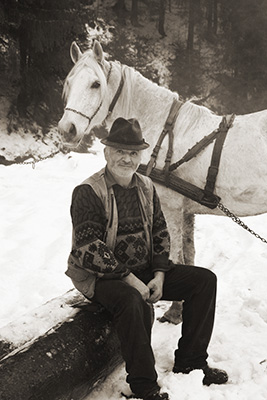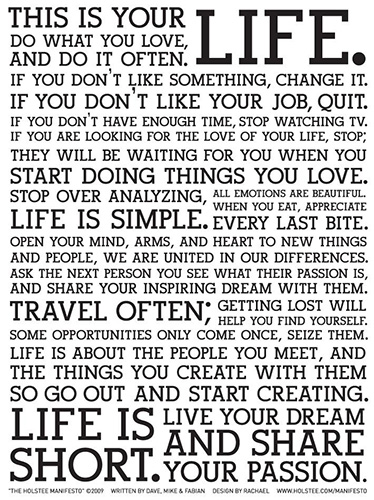
7 Pearls of Wisdom for Living a Fulfilling Life
It’s amazing to look around at the people you come across in life and observe just how different their life experiences have been. Some are filled with an immense joy of living, while others seem to have been beaten down and disillusioned by life.
Why the difference?
Who can say? Probably a lot of things.
But there’s no denying that a person’s mindset and attitude play a major role. How they see life and how they approach it.
Too many people just sit back and let life happen to them. They basically make themselves victims of circumstance. That’s a scary place to be when you really think about it.
The more astute people go out and make their life happen. They take responsibility for their own destiny. Hopefully you’re one of those people, or at least aspire to be.
If you are, you’re someone who understands the importance of wisdom and learning. Below are 7 pearls of wisdom that will help you find fulfilment and success in your life. Use them diligently at every opportunity and life will really begin to shine for you.
1. Life’s blessings and curses are fleeting
One major cause of stress in our society is the fixation we have on categorising events in our life as either blessings or curses, good or bad fortune, successes or disasters – whatever you care to call them. As if they’re set in stone as either enduringly good or bad.
This mindset only leads us to exaggerate the gravity, or importance, of each event, causing us to fret and worry excessively over the outcome.
 As a typical example, look at how much pressure and stress school students are under these days to do well in exams. Almost as if their future and entire livelihood hinged entirely on their outcome.
As a typical example, look at how much pressure and stress school students are under these days to do well in exams. Almost as if their future and entire livelihood hinged entirely on their outcome.
The fact is, blessings come and blessings go. And curses come and curses go.
Think about some event in your past that went horribly wrong. Even a major one. Was it the end of the world? If you’re reading this, then probably not.
In fact, you may even have found that looking back, it didn’t even really matter all that much in the grand scheme of things.
Why is that?
Well, because life went on. It may have paused momentarily or changed direction somewhat – you may have had to adjust your plans a little, or even a lot – but it went on.
And here’s the interesting thing – when life did change direction, it may well have actually led you to something even more positive that you didn’t foresee. That’s not as uncommon as you might think.
Before something great happens, everything fall apart.
Life itself is an ongoing, unending flow of ups and downs. And you never know when or where an up or a down will come your way.
A so-called “curse” today can quickly be rendered insignificant by a so-called “blessing” tomorrow. And as I just mentioned, sometimes that curse itself may even unexpectedly transform into a blessing.
And of course, the opposite is also true.
Recently, a close friend of mine told me about a Chinese folk tale that illustrates this point perfectly. It’s called The Old Man and the White Horse, and apparently originates from the days of Lao Tzu, who, it seems, loved it very much. For generations his followers have been repeating the story and finding more and more meaning in it. More recently, it has also been printed in a book by Max Lucando entitled In the Eye of the Storm.
Anyhow, here’s the tale . . .
Once there was an old man who lived in a tiny village. Although poor, he was envied by all, for he owned a beautiful white horse. Even the king coveted his treasure. A horse like this had never been seen before – such was its splendour, its majesty, its strength.
People offered fabulous prices for the steed, but the old man always refused. “This horse is not a horse to me,” he would tell them. “It is a person. How could you sell a person? He is a friend, not a possession. How could you sell a friend?” The man was poor and the temptation was great. But he never sold the horse.
 One morning he found that the horse was not in his stable. All the village came to see him. “You old fool,” they scoffed, “we told you that someone would steal your horse. We warned you that you would be robbed. You are so poor. How could you ever protect such a valuable animal? It would have been better to have sold him. You could have gotten whatever price you wanted. No amount would have been too high. Now the horse is gone and you’ve been cursed with misfortune.”
One morning he found that the horse was not in his stable. All the village came to see him. “You old fool,” they scoffed, “we told you that someone would steal your horse. We warned you that you would be robbed. You are so poor. How could you ever protect such a valuable animal? It would have been better to have sold him. You could have gotten whatever price you wanted. No amount would have been too high. Now the horse is gone and you’ve been cursed with misfortune.”
The old man responded, “Don’t speak too quickly. Say only that the horse is not in the stable. That is all we know; the rest is judgement. If I’ve been cursed or not, how can you know? How can you judge?”
The people contested, “Don’t make us out to be fools! We may not be philosophers, but great philosophy is not needed. The simple fact that your horse is gone is a curse.”
The old man spoke again. “All I know is that the stable is empty, and the horse is gone. The rest I don’t know. Whether it be a curse or a blessing, I can’t say. All we can see is a fragment. Who can say what will come next?”
The people of the village laughed. They thought that the man was crazy. They had always thought he was a fool; if he wasn’t, he would have sold the horse and lived off the money. But instead, he was a poor woodcutter, and old man still cutting firewood and dragging it out of the forest and selling it. He lived hand to mouth in the misery of poverty. Now he had proven that he was, indeed, a fool.
After fifteen days, the horse returned. He hadn’t been stolen; he had run away into the forest. Not only had he returned, he had brought a dozen wild horses with him. Once again, the village people gathered around the woodcutter and spoke. “Old man, you were right and we were wrong. What we thought was a curse was a blessing. Please forgive us.”
The man responded, “Once again, you go too far. Say only that the horse is back. State only that a dozen horses returned with him, but don’t judge. How do you know if this is a blessing or not? You see only a fragment. Unless you know the whole story, how can you judge? You read only one page of a book. Can you judge the whole book? You read only one word of one phrase. Can you understand the entire phrase?”
 “Life is so vast, yet you judge all of life with one page or one word. All you have is one fragment! Don’t say that this is a blessing. No one knows. I am content with what I know. I am not perturbed by what I don’t.”
“Life is so vast, yet you judge all of life with one page or one word. All you have is one fragment! Don’t say that this is a blessing. No one knows. I am content with what I know. I am not perturbed by what I don’t.”
“Maybe the old man is right,” they said to one another. So they said little. But down deep, they knew he was wrong. They knew it was a blessing. Twelve wild horses had returned. With a little work, the animals could be broken and trained and sold for much money.
The old man had a son, an only son. The young man began to break the wild horses. After a few days, he fell from one of the horses and broke both legs. Once again the villagers gathered around the old man and cast their judgements.
“You were right,” they said. “You proved you were right. The dozen horses were not a blessing. They were a curse. Your only son has broken both his legs, and now in your old age you have no one to help you. Now you are poorer than ever.”
The old man spoke again. “You people are obsessed with judging. Don’t go so far. Say only that my son broke his legs. Who knows if it is a blessing or a curse? No one knows. We only have a fragment. Life comes in fragments.”
It so happened that a few weeks later the country engaged in war against a neighbouring country. All the young men of the village were required to join the army. Only the son of the old man was excluded, because he was injured. Once again the people gathered around the old man, crying and screaming because their sons had been taken. There was little chance that they would return. The enemy was strong, and the war would be a losing struggle. They would never see their sons again.
“You were right, old man,” They wept. “God knows you were right. This proves it. Your son’s accident was a blessing. His legs may be broken, but at least he is with you. Our sons are gone forever.”
The old man spoke again. “It is impossible to talk with you. You always draw conclusions. No one knows. Say only this. Your sons had to go to war, and mine did not. No one knows if it is a blessing or a curse. No one is wise enough to know. Only God knows.”
This tale really throws a different perspective on life for many of us. As it says, in the book of life each individual situation is merely a page or a paragraph. Who can say what will come next?
You certainly can’t judge the entire book based on a small fragment.
Sunny days and rainy days both come and pass. None of us expects either to last forever. A sunny day can also turn bad, and a rainy day can clear up to become bright. This is easy to accept because we see it happen all the time.
Well, life’s blessings and curses are exactly the same. But strangely, often times people don’t see them that way. They treat them as if they’re here to stay. And that’s a mistake.
So how, then, can this understanding about the temporary nature of life’s blessings and curses help you to lead a happier, more fulfilling life?
Well, there are several ways.
Firstly, when life grants you some kind of “blessing” you should value it in the moment for what it is. Because you never know when it will be taken from you. That doesn’t mean to gloat and become cocky over your good fortune. But rather, just to be grateful for the gift and quietly appreciate what you’ve been given.
 Secondly, you should make the most of a blessing to enrich and improve your life while you have it. For example, if it’s an opportunity, take it. If it allows you to help someone else, do it. More often than not, helping others does as much for you as it does them.
Secondly, you should make the most of a blessing to enrich and improve your life while you have it. For example, if it’s an opportunity, take it. If it allows you to help someone else, do it. More often than not, helping others does as much for you as it does them.
You get the idea.
Please don’t take this to mean that you need to become a pessimist, focusing on an inevitable reversal of all your good fortunes. Nothing is inevitable – that’s the whole point.
The only thing that’s certain is now. That’s all any of us truly has.
Simply put, don’t take your gifts for granted. And remember that the greatest gifts you have are your life and the people in it.
So what about curses?
Well, once you understand that they’re fleeting, you won’t think of them as such a big deal anymore in the grand scheme of your life. You won’t stress over them and worry yourself sick. Curses are never nice, but one way or another, like clouds, each of them ultimately passes. And then everything is OK again.
Some people like to draw comfort from the idea that everything happens for a reason.
Personally, I don’t believe that. I believe that things just happen, and you choose how to deal with bad situations the best you can. Then, perhaps with the help of a blessing or two that may come your way, things work out just fine.
In the end, the overall quality of your life becomes a reflection not of what hands you were dealt along the way, but how you responded to them.
The happiest people don’t have the best of everything, they just make the best of everything they have.
There’s no point, then, passing judgement on or stressing over any event that comes your way in life. You never know how long it will last, whether it will sooner or later lead to good, or whether it will lead to bad.
The most productive approach is to take each situation as it comes, be grateful for the positives and make the best of the negatives. Either way, the cycle of life will continue.
2. Responding > reacting
There’s a wise old saying:
Never reply when you are angry. Never make a promise when you are happy. Never make a decision when you are sad.
In a nutshell, what this is saying is that you should never react to a situation based upon your emotions.
It’s a natural thing to do. After all, your emotions influence most of your behaviours. And when someone or something gets you into an emotional state, it’s actually often a challenge not to react without thinking.
The problem is that emotions are temporary, and many decisions and actions have consequences that aren’t. So when you’re in a heightened emotional state, it’s very easy to react to a situation in a way that you later regret.
That can have serious consequences for a friendship, a relationship, your job, your business, your health, or many other important areas of your life.
 It takes a high level of maturity and restraint, but it possible to learn to respond to such situations rather than react.
It takes a high level of maturity and restraint, but it possible to learn to respond to such situations rather than react.
The next time someone or something causes you to get angry, hurt, offended, sad, etc., the first step is to take a deep breath and think. Resist that overwhelming desire to blurt something out from your heart with no input from your head.
As I said, there’s probably nothing that would make you feel better in the moment, but the moment will quickly pass. And you’ll be left with the fallout of what you said.
The best thing you can do for yourself is to take as much time as possible to formulate your response. If you’re in a verbal conversation that may only be a few seconds. If you can ask to get back to the person with a response, do it.
He who angers you, conquers you.
Whatever the case and whatever the situation, you MUST give yourself some time to think. Ideally, you should make your response once some, if not all, your emotion has dissipated if possible. That way it will be made rationally and sensibly, with an outcome that’s in your very best interests.
Learning to respond with a level head to people and situations, great and small, is invaluable to your progress and ultimate success in life. If you’re consistently finding it too tough to do, start with smaller incidents and slowly work your way up.
Keep doing your best, and you’ll get there.
3. The greater the risk, the greater the reward
As individuals we’re all comfortable with different levels of risk in different areas of our life.
The funny thing though is that, except where money and business is involved, not many people give much thought to the fact that the greater risk that they’re prepared to take, the greater the reward they stand to enjoy.
People have a natural tendency to avoid scary or uncomfortable situations. To play it safe.
That’s how comfort zones are made.
Sometimes, fear can paralyse you into inaction in your personal life. Because the thought of failure, of rejection, of embarrassment, of judgement, or whatever else, is just too great.
But that fear seriously limits the quality of your life.
In some areas of life, such as money, business and health, risk is something that can bring serious repercussions, so it needs very careful evaluation with expert guidance. I’m certainly not qualified to give you that.
 But what if you were prepared to fail big in some area of your personal life?
But what if you were prepared to fail big in some area of your personal life?
What if you were willing to endure the pain of defeat and disappointment time and time again?
What if you had the guts to dare to dream big, knowing the chances of success were only slim?
Well, how else do you think anyone who ever achieved something extraordinary in their life managed to do that? By playing it safe?
I don’t think so.
Being realistic is the most common path to mediocrity.
The breadth of your living experiences is determined by how far you’re prepared to extend yourself. Or more specifically, far you’re prepared to expand your comfort zone.
Failure is painful, so risk is scary.
But that’s simply the price you have to pay to reap the bigger rewards of life.
Remember, if something doesn’t kill you it will only make you stronger.
Sure, you can play it safe and avoid pain your entire life. But think about how you would feel about that looking back on your life when it’s nearly over. Would you consider your life to have been lived to the full?
Only you can answer that question.
4. It’s all about you
I have a female friend who, although very feminine, isn’t exactly the “princess” type who expects acts of chivalry on behalf of men. She once told me of an occasion where she was on a date with a man and he held open the door for her as they entered a restaurant.
She said to her date, “You don’t need to do that for me”, to which he replied, “I’m not doing it for you, I’m doing it for me”.
That story really stuck with me.
Although his comment was most likely somewhat tongue in cheek, I feel there was still an element of truth to it. Basically, what he was saying was that he was simply being a gentleman, whether or not it was appreciated or expected by her.
So really, it was for his benefit as much as hers.
I’ve always believed that whatever it is you do to or for others, you actually do to and for yourself as well.
If you harm someone, for example, the pain you cause them may only last a short time. But in doing so you’re making yourself a bully, and your character is something that you carry with you for a lifetime. If you show kindness to someone, on the other hand, again, it shapes your character and who you are, but for the better.
Show respect even to people who don’t deserve it, not as a reflection of their character, but as a reflection of yours.
So when you look at how your actions and behaviour affect those around you, don’t forget to think about how they affect you as well. That’s what you should be more concerned about.
 What kind of person do you want to be?
What kind of person do you want to be?
Do you want to be a bully? A thief? A cheat? Someone who can’t be trusted? Someone who isn’t respected?
Or would you rather be a kind, compassionate, trustworthy and appreciated person?
Some people believe that Karma sooner or later takes revenge on people for their misdeeds in life. I don’t believe that’s true. At least, not in the direct sense that most people think.
I believe that your choices and actions shape the kind of person you are, and your reward or punishment is simply going through life as the kind of person you make yourself.
I follow three rules: Do the right thing, do the best you can, and always show people you care.
When you do the right thing, live diligently and make yourself the best person you can be, good things undoubtedly come your way.
So bear in mind that when making choices in your life, it’s all about you.
Don’t think about what you feel like doing in the moment, what’s easy to do in the moment, or what you can get out of someone in the moment. Moments pass.
Think instead about what kind of character you’re shaping for yourself. Because that’s for life.
5. With foresight comes the benefit of hindsight
There’s nothing quite like the wisdom of hindsight, as it gives you a 100% accurate picture of the outcome of any decision you happen to make.
Hindsight is always twenty-twenty.
But what if you could actually get the benefit of hindsight before you make a choice about something? Wouldn’t that be a helpful thing?
How do you do that? Simple . . . by using a bit of foresight.
Most people, when faced with a tough choice, think to themselves, “Should I, or shouldn’t I?” They do their best to weigh up the pros and cons in the present, and then make a decision . . . “Yes, or no?”
To use hindsight through foresight, try this little twist next time you have a difficult decision to make:
 Close your eyes and detach yourself from the emotion and concern you have over the decision. Just clear your mind, and forget about it. Let it go. Then, imagine yourself the day after having decided “yes” to your choice, and think about how you feel.
Close your eyes and detach yourself from the emotion and concern you have over the decision. Just clear your mind, and forget about it. Let it go. Then, imagine yourself the day after having decided “yes” to your choice, and think about how you feel.
Take a few minutes to actually put yourself emotionally and mentally into that situation, looking back on the choice you made the day before.
Do you regret your choice now? Are you having second thoughts? Do you think it was an impulsive and short-sighted decision? Or are you still feeling confident that it was the right thing to do?
Now repeat the procedure. Clear your mind, but this time imagine yourself the day after having decided “no” to the choice. How do you feel about that the next day?
Using this technique you essentially channel hindsight as best you can to make a wise choice when it’s hard to decide on some issue. It can really help you to avoid making decisions that you later regret.
You can't help but . . . with 20/20 hindsight, go back and say, “Look, had we done something different, we probably wouldn't be facing what we are facing today.”
Making decisions that are driven by instant gratification is something that children typically almost always do. It takes a certain level of maturity to be able to consider the longer-term when making a tough choice by removing yourself from the present.
6. Follow your heart
Wisdom is defined as being “the power of discerning and judging properly as to what is true or right”.
Even though your level of wisdom increases as you get older, the fact is that we all possess wisdom within us. At any age.
It’s basically an “inner knowing” that’s sometimes referred to as instinct or intuition.
The problem is that while your intuition develops with age, so too do the obstacles to its free expression. These come in the form of negative programming of your mind.
 As you journey through life, you’re taught countless untruths by people and painful experiences, such as “life is tough”, “you can’t trust anyone”, “you have to be realistic”, “you have to make a good impression”, “failure is bad”, “marriage is a prison”, “you can’t do this”, “you can’t do that”, “money is the root of all evil”, “you’re weird”, you’re ugly”, “don’t take risks”, and so on, and so on.
As you journey through life, you’re taught countless untruths by people and painful experiences, such as “life is tough”, “you can’t trust anyone”, “you have to be realistic”, “you have to make a good impression”, “failure is bad”, “marriage is a prison”, “you can’t do this”, “you can’t do that”, “money is the root of all evil”, “you’re weird”, you’re ugly”, “don’t take risks”, and so on, and so on.
And unfortunately, these lies that are programmed into your head get in the way of your being able to listen to the truths than are in your heart.
The challenge is to be able to discern between the truths and the lies, because the lies can feel right to you after half a lifetime of programming. They become your friends. Like an unhealthy addiction.
So how do you tell the difference?
Simple.
Following the lies in your head takes effort. It’s heavy. It’s complicated. It’s confusing. It makes you feel like there’s too much to process. Fear and worry are involved. They make you feel encumbered rather than free.
Following your intuition, on the other hand, is light, natural and simple. It feels like a relief. It feels refreshing, exciting and freeing. Like your potential and the possibilities are limitless.
When you follow your heart, it feels like home. And you know it’s truth.
Everyone has that inner voice, the one that's a Negative Nancy. I'd say to ignore that voice and to be confident and follow your heart.
To make the right choices and find your true path in life you need to learn to shut out the noise in your head, and listen to your heart.
Don’t overthink things. Don’t try to force the right answers to reveal themselves. The effort only cranks up your head even more. It becomes paralysis by analysis.
Just let your mind still itself.
Stop worrying. Stop stressing. Stop trying.
It takes courage, I know. Kind of like jumping off a cliff and trusting your wings. Because life has taught you that you have to hold on. To stay in control.
Not to trust.
But when you do manage to just let go and find that peaceful place where you’re ready to accept whatever comes your way without prejudice, you’ll find the truth will be staring you in the face.
7. Live each day like it’s your last
This little gem of wisdom is so well known that it’s virtually become a cliché.
The problem is that many people take it to mean that you should party each day with no regard for the future. Enjoy the moment, so to speak.
Of course, that’s not what it’s about at all.
 What it really means is that you shouldn’t ever take life for granted. Because you never know when it’s going to end. So that means not wasting time in pursuing your goals and dreams, and not leaving the important things hanging as though there’s unlimited time to get them done.
What it really means is that you shouldn’t ever take life for granted. Because you never know when it’s going to end. So that means not wasting time in pursuing your goals and dreams, and not leaving the important things hanging as though there’s unlimited time to get them done.
Life is short. Do stuff that matters.
Ask yourself this question: “If you were to have your life all over again, would you do anything different?”
If the honest answer is “yes”, then NOW is the time to start making changes in your life.
Of course, you can never change the past, but you can determine where your life goes from here. Mistakes can’t be unmade, but they can and should be learned from. And if you put your mind to it, maybe you can work it so that some other benefit comes from them as well.
If you’ve been lazy or complacent in chasing your dreams, it’s time to pull the finger out and start living with some passion and urgency. You don’t have forever, after all.
And if you’ve found that life has carried you down a path that’s miserable and unfulfilling, one that’s steering you further and further from your dreams and goals, then you need to change your direction as soon as you can.
Better late than never, as they say. The only thing worse than being on the wrong path for thirty years is being on the wrong path for thirty years and one day.
So just do it.
None of us can ever predict when our time will come. For some it comes way too early.
I was sadly reminded of that just last week when a friend from the fitness world named Andy Page tragically passed away in her sleep. She was one of the most energetic and vibrant people I have ever met, and at just thirty-something years of age her life was cut short while still in her prime.
It was a huge shock to me and to everyone who knew and loved Andy, but also a sobering reminder of how fragile life can be.
Even if your life is cut short, there are absolutely no reasons for regret if it had meaning and you were on your chosen path, working full steam ahead toward your dreams. After all, the journey is every bit as much a reward as the dream itself.
So in a way, to chase your dream is to actually live your dream.








No Comments